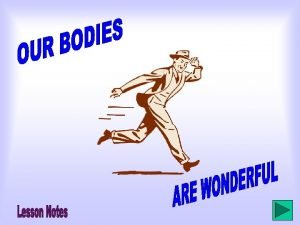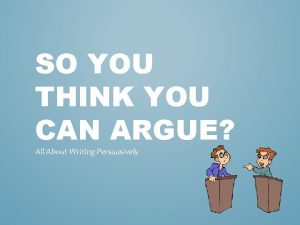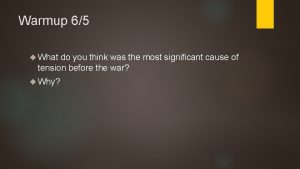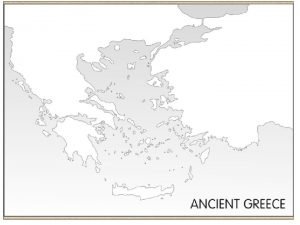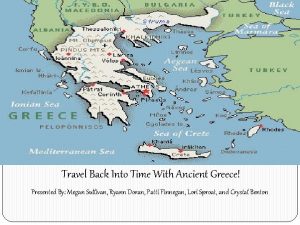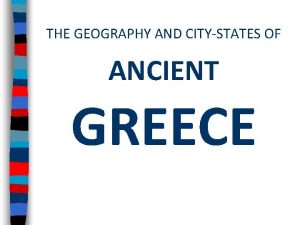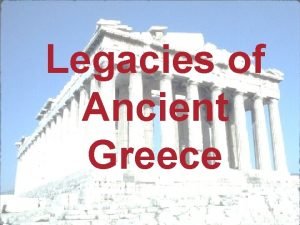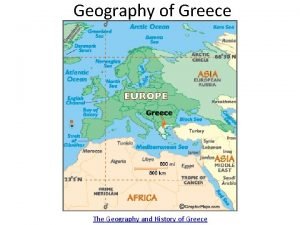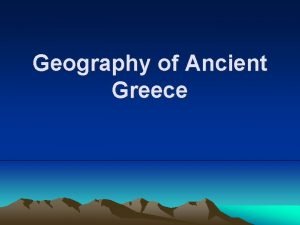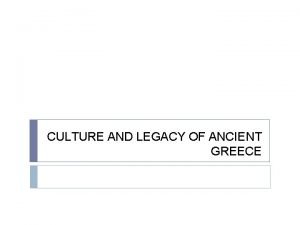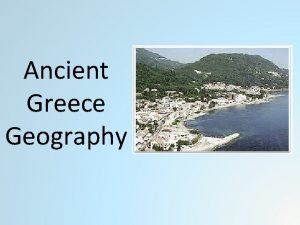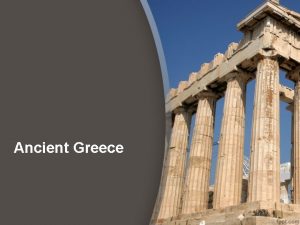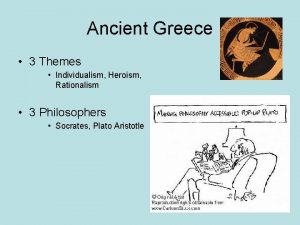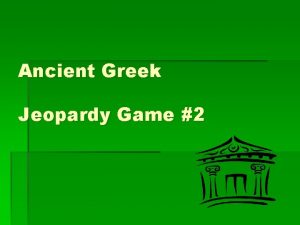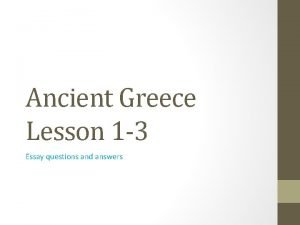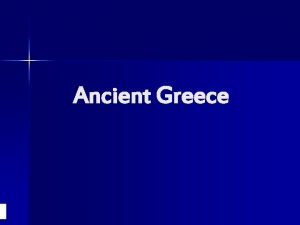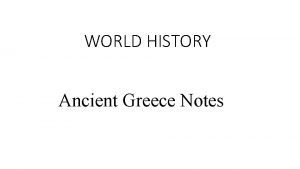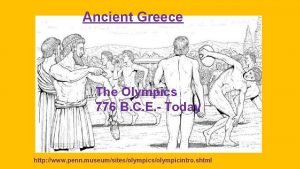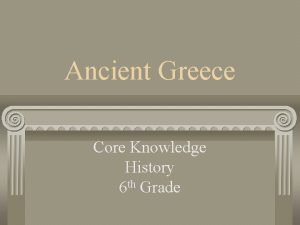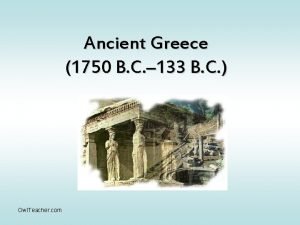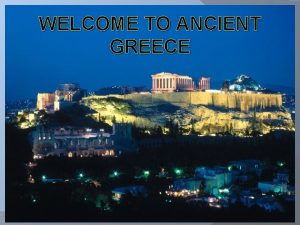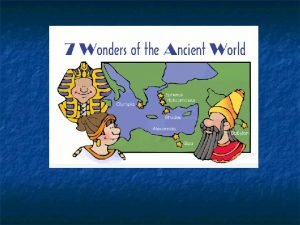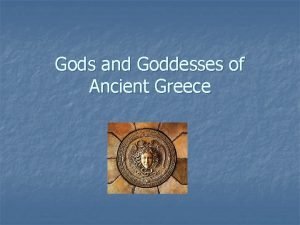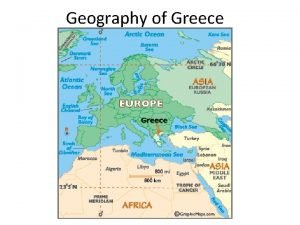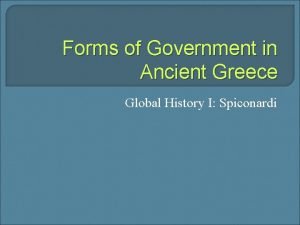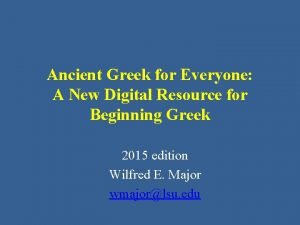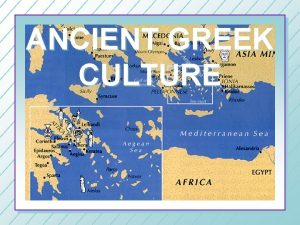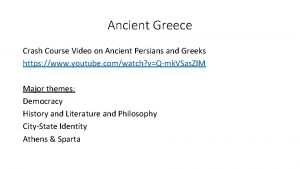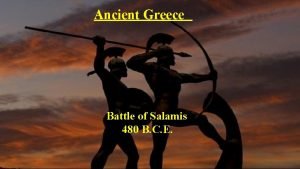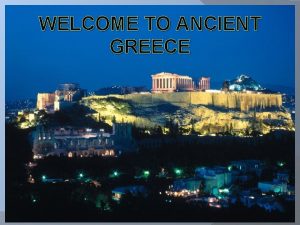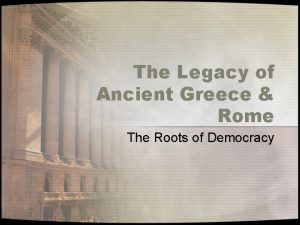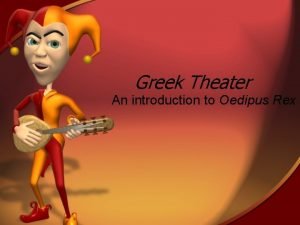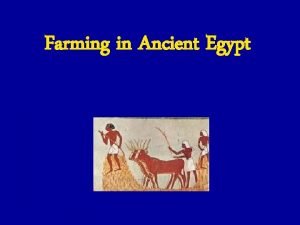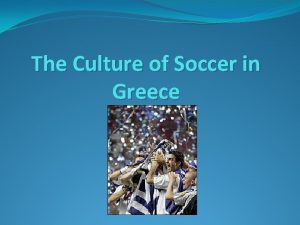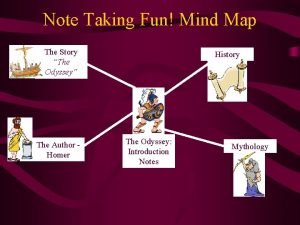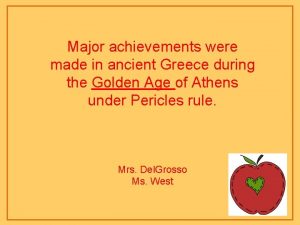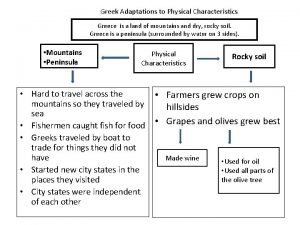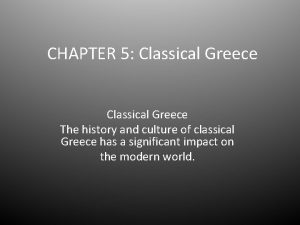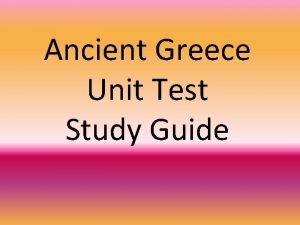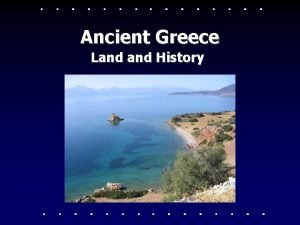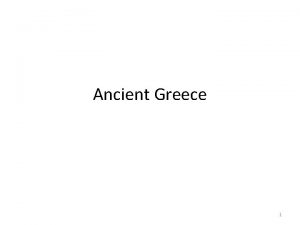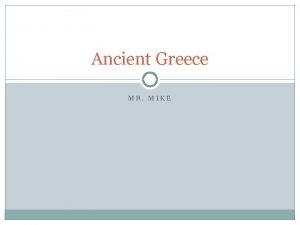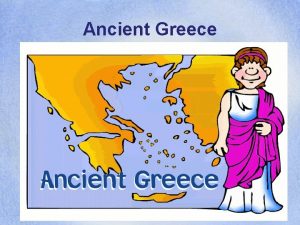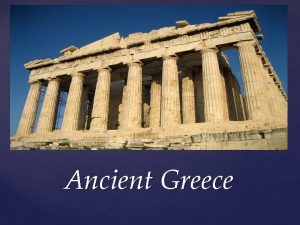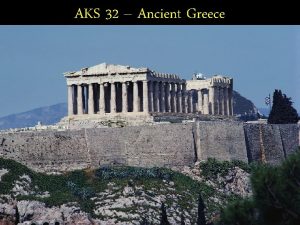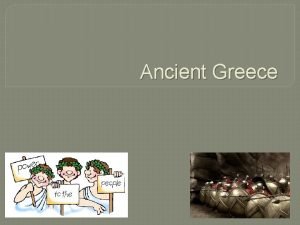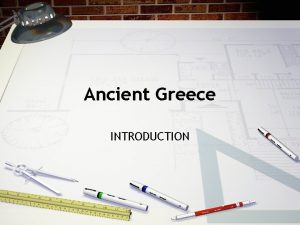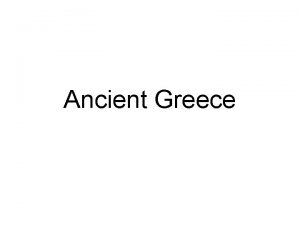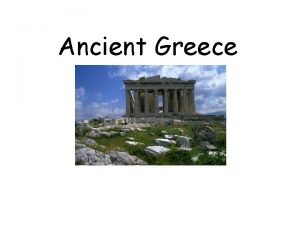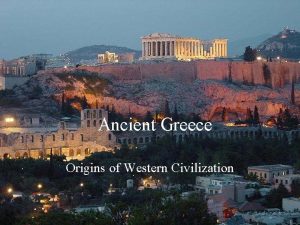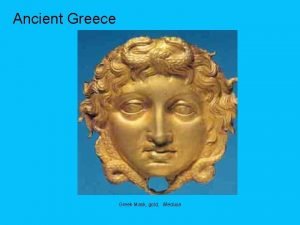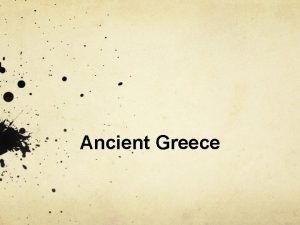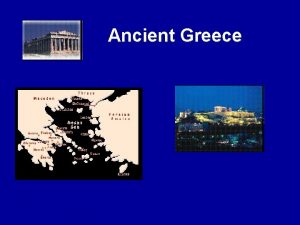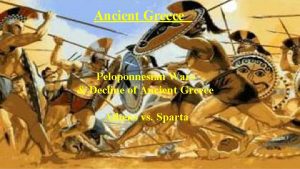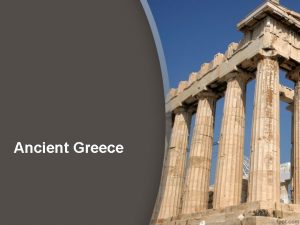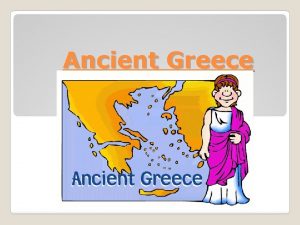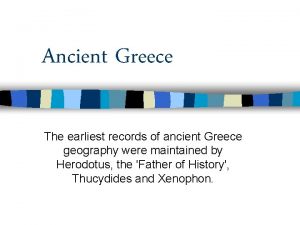ANCIENT GREECE WARMUP Can you think of any



















































![Peloponnesian War 431– 404 [B. C. E. ] • Caused by competition for control Peloponnesian War 431– 404 [B. C. E. ] • Caused by competition for control](https://slidetodoc.com/presentation_image_h/03aab2ad9babdd16e9bd2f876bbbc9ff/image-52.jpg)

![Importance of Peloponnesian War 431– 404 [B. C. E. ] • Results: –Slowed cultural Importance of Peloponnesian War 431– 404 [B. C. E. ] • Results: –Slowed cultural](https://slidetodoc.com/presentation_image_h/03aab2ad9babdd16e9bd2f876bbbc9ff/image-54.jpg)
































- Slides: 86

ANCIENT GREECE

WARMUP. Can you think of any examples of Ancient Greece used in today’s popular media? (TV, Movies, Etc…) 2. What are some famous Greek names that you have heard of? 3. What about in other subjects in school? Are there any visible contributions of Greek culture?

The Geography of Greece

Ancient Greece • SSWH 3 Examine the political, philosophical, and cultural interaction of Classical Mediterranean societies from 700 BCE/BC to 400 CE/AD. • a. Compare the origins and structure of the Greek polis, the Roman Republic, and the Roman Empire. • b. Identify the ideas and impact of important individuals, include: Socrates, Plato, Aristotle, Alexander the Great, Julius Caesar, and Augustus Caesar. • c. Analyze the impact of Greek and Roman culture, politics, and technology. • d. Describe polytheism in the Greek and Roman world.

Geography –EQ: In what ways did geography and climate shape Greek life?


Bronze Age Greece

• Origins • Mycenaeans—Indo-Europeans who settled on Greek mainland in 2000 B. C. • Took their name from their leading city, Mycenae • Mycenaean warrior-kings dominate Greece from 1600– 1100 B. C.

The Mycenaean Civilization

The Mask of Agamemnon


• The Trojan War—fought by Mycenaeans against city of Troy in 1200 s B. C. • Once thought to be fictional, archaeological evidence has been found • Heinrich Schliemann

Bronze Age Enemies: The Trojan War

What were the real & mythical causes of the Trojan War? ?

Helen of Troy: “The Face That Launched a 1000 Ships” What did she look like?

The “Trojan Horse”?


• Ca 1200 B. C. the Dorians invaded. They were less advanced than the Mycenaeans. Economy collapsed, trade halted and Greeks temporarily lost the art of writing. No records for 400 years.

Homer: The “Heroic Age”

Homer, the Blind Poet

Homer’s Great Epics

QUESTION! • How did mythology help the early Greek civilization explain the natural world and the human condition?

• Greeks Create Myths • Polytheistic Religion • Greeks develop their own myths— traditional stories about gods • Greeks seek to understand mysteries of life through myths • Offered explanations of natural phenomena, human qualities, and life events • Greeks attribute human qualities—love, hate, jealousy—to their gods • Zeus, ruler of Gods, lives on Mount Olympus with his wife, Hera • Zeus’s daughter Athena is goddess of wisdom and guardian of cities


ATHENS: Yesterday & Today

Political developments • Mountains both helped and hindered the development of citystates • Greek cities were designed to promote civic and commercial life • Colonization was prompted by overpopulation and the search for arable land

Economic and Social Developments • • • Agriculture (limited arable land) Commerce and the spread of Hellenic culture Shift from barter to money economy (coins)

Foundations of Democracy • Classical Athens developed the most democratic system of government the world had ever seen, although not everyone could participate in decision making. It became a foundation of modern democracies.

GREEK POLITICS • Citizens had political rights and the responsibility of civic participation in government. • Who is a citizen? – FREE – ADULT – MALE • Women and foreigners had no political rights. • Slaves had no political rights.

• Polis – the city-state was the fundamental political unit in ancient Greece • A city-state is an independent country whose territory consists of a city which is not administered as part of another government. • Democracy – rule by the people

Athens • Boys schooled and prepared for military service – Daily physical activity – Military rank based on social status • Girls prepared for home service life

• Stages in the evolution of Athenian government: monarchy, oligarchy, tyranny, democracy • Tyrants who worked for reform: Draco, Solon • Draco: Solon: • Origin of democratic principles: Direct democracy, public debate, duties of the citizen

Early Athenian Lawgivers $ Draco Developed a legal code – very harsh § “draconian” $ Solon – outlawed debt slavery $ Cleisthenes § created the first democracy! § Only free adult male property owners were citizens

SPARTA

SPARTA • A Unique City-State • Sparta, isolated from much of Greece, builds military state • Oligarchy (rule by a small group) • Rigid social structure • Military society Helots Messenians enslaved by the Spartans.

Sparta Military rather than democratic led to development of strong military Boys sent off at 7 Trained until 20 Member until 60

Persian Wars: 499 BCE – 480 BCE

Persian Wars • A New Kind of Army Emerges • Cheaper iron replaces bronze, making arms and armor cheaper • Leads to new kind of army; includes soldiers from all classes • Phalanx—feared by all, formation of soldiers with spears, shields

The Persian Wars • A series of conflicts between the Empire of Persia and city-states of the Hellenic world that started in 499 BCE and lasted until 450 BCE.

Persian Wars: Famous Battles $ Marathon (490 BCE) § 26 miles from Athens’ victory was overwhelming: 6, 400 Persians but only 192 Athenians died Messenger ran about 25 mi (40 km) back to Athens, where he announced the victory before dying of exhaustion In another version, an Athenian runner was sent to Sparta before the battle to ask for help, running 150 miles in two days; Sparta refused

Persian Wars: Famous Battles • Thermopylae (480 BCE) • Battle in northern Greece (480 BC) in the Persian Wars. The Greek forces, mostly Spartan, were led by Leonidas. After three days of holding their own against the Persian king Xerxes I and his vast southward-advancing army, the Greeks were betrayed, and the Persians were able to outflank them. Sending the main army in retreat, Leonidas and a small contingent remained behind to resist the advance and were killed to the last man.

Xerxes

Leonidas

Persian Wars: Famous Battles • Salamis (480 BCE) • The Greek fleet of some 370 ships, under the command of Themistocles, lured the Persian fleet of about 800 ships into the narrow strait between the island of Salamis and the Athenian port of Piraeus. • Athens sank about 300 Persian vessels while losing only about 40 of their own. • As a result of this battle, Xerxes had to postpone his planned land offensive, giving the Greek city-states time to unite against him.

• Greek city-states form the Delian League • Athens emerged as the leader of the Delian League

Why are the Persian Wars important? • 1. Persian wars united Athens and Sparta against the Persian Empire. • 2. Athenian victories over the Persians at Marathon and Salamis left Greeks in control of the Aegean Sea. • 3. Athens preserved its independence and continued innovations in government and culture

Golden “Age of Pericles”: 460 BCE – 429 BCE

Golden Age of Pericles 460 BCE – 429 BCE • Pericles as Leader • Skillful politician, inspiring speaker, respected general • Dominates life in Athens from 461 to 429 B. C. • Stronger Democracy • Pericles hires more public officials; creates direct democracy • Direct democracy—citizens rule directly, not through representatives • Athenian Empire • Takes over Delian League; uses money to strengthen Athenian fleet • Sparta and other cities resent Athenian power

Golden Age of Pericles • Pericles had Athens rebuilt after destruction in the Persian Wars; the Parthenon is an example of this reconstruction.

Peloponnesian Wars

SPARTA
![Peloponnesian War 431 404 B C E Caused by competition for control Peloponnesian War 431– 404 [B. C. E. ] • Caused by competition for control](https://slidetodoc.com/presentation_image_h/03aab2ad9babdd16e9bd2f876bbbc9ff/image-52.jpg)
Peloponnesian War 431– 404 [B. C. E. ] • Caused by competition for control of the Greek world: – Athens and the Delian League vs Sparta and the Peloponnesian League

Athenians and Spartans Go to War • War Begins 431 B. C. city-states Sparta and Athens at war— Peloponnesian War • Peloponnesian War -Sparta has better army, Athens has better navy -Plague strikes Athens in 430 B. C. , kills many— including Pericles -Sparta and Athens sign truce in 421 B. C. • Sparta Gains Victory -415 B. C. Athens renews war, attacks Syracruse; is defeated in 413 B. C. – Athens and allies surrender to Sparta in 404 B. C.
![Importance of Peloponnesian War 431 404 B C E Results Slowed cultural Importance of Peloponnesian War 431– 404 [B. C. E. ] • Results: –Slowed cultural](https://slidetodoc.com/presentation_image_h/03aab2ad9babdd16e9bd2f876bbbc9ff/image-54.jpg)
Importance of Peloponnesian War 431– 404 [B. C. E. ] • Results: –Slowed cultural advance –Weakened political power

Philosophy • Athenians looking for answers • Philosophy- “love of wisdom” • Based thinking on two assumptions – The universe orderly and has laws – People can understand these laws through logic and reason

Great Athenian Philosophers $ Socrates Encouraged Greeks to think more question themselves and their moral character “there is only one good, knowledge, and only one evil, ignorance” Socratic method Question and answer series 399 B. C. arrested for corrupting the youth and neglecting the gods Poisoned himself to death

Quick Question to Ponder • Socrates said that the unexamined life is not worth living. – What did he mean? – To what extent do you agree or disagree with his statement? – Have you ever examined your own role in society?

$Plato $Student of Socrates §The Academy §The world of the FORMS §The Republic philosopher-king Set forth vision for perfectly governed society All citizens fall into 1 of 3 groups naturally Farmers and artisans Warriors Ruling class-person with greatest intellect and insight would be ruler

Another Question to Ponder • Plato indicated that he would not allow poets to be part of his ideal society. – Why did he say this? – Who would you be sure to include in a utopia of your own design?

Great Athenian Philosophers $ Aristotle $ Student of Plato § The Lyceum § “Golden Mean” [everything in moderation]. § Logic. § Scientific method. § “he who studies how thing originated…will achieve the clearest view of them all. ”

Athens: The Arts & Sciences $ DRAMA (tragedians): § Aeschylus § Sophocles § Euripides $ THE SCIENCES: § Pythagoras § Democritus all matter made up of small atoms. § Hippocrates “Father of Medicine”

Phidias’ Acropolis

The Acropolis Today

The Parthenon

The Agora

The Classical Greek “Ideal”

Olympia

The Ancient Olympics: Athletes & Trainers

Olympia: Temple to Hera

The 2004 Olympics

Philip Builds Macedonian Power • Macedonia -Macedonia—kingdom of mountain villages north of Greece -King Philip II—ruler, brilliant general; dreams of controlling Greece • Conquest of Greece -338 B. C. Macedonians defeat Greece; 336 B. C. King Philip murdered -His son named king of Macedonia—becomes Alexander the Great

Macedonia Under Philip II


Alexander the Great

Alexander Defeats Persia • Alexander’s Early Life -Tutored by Aristotle; inspired by the Iliad; has military training -Becomes king when 20 years old • Invasion of Persia -334 B. C. Alexander invades Persia; quick victory -Darius III—king of Persia, assembles army of 50, 000– 75, 000 men -Alexander defeats Persians again, forces King of Persia to flee • Conquering the Persian Empire -Alexander marches into Egypt, crowned pharaoh in 332 B. C. -At Gaugamela in Mesopotamia, Alexander defeats Persians again

• Alexander in India -Alexander conquers Indus Valley area in 326 B. C. Reluctantly returns to Babylon, dies in 323 B. C • Alexander’s Legacy -Alexander melds Greek and Persian cultures; wife is Persian -Empire becomes three kingdoms: (1) Macedonia, Greek city-states; • (2) Egypt; • (3) old Persia, also known as Seleucid kingdom

Alexander the Great’s Empire

Alexander the Great in Persia

The Hellenization of Asia

The Spread of Hellenistic Culture • Hellenistic Culture in Alexandria -Result of Alexander’s policies—a new vibrant culture -Hellenistic culture—Greek blended with Egyptian, Persian, Indian • Trade and Cultural Diversity -Alexandria—Egyptian city becomes center of Hellenistic civilization

Pergamum: A Hellenistic City

The Economy of the Hellenistic World

Hellenistic Philosophers $ Cynics Diogenes § ignore social conventions & avoid luxuries. § citizens of the world. § live a humble, simple life. $ Epicurians Epicurus § avoid pain & seek pleasure. § all excess leads to pain! § politics should be avoided.

Hellenistic Philosophers $ Stoics Zeno § nature is the expansion of divine will. § concept of natural law. § get involved in politics, not for personal gain, but to perform virtuous acts for the good of all. § true happiness is found in great achievements.

Hellenism: The Arts & Sciences $ Scientists / Mathematicians: § Aristarchus heliocentric theory. § Euclid geometry § Archimedes pulley $ Hellenistic Art: § More realistic; less ideal than Hellenic art. § Showed individual emotions, wrinkles, and age!

The Breakup of Alexander’s Empire
 If you think you can you can poem
If you think you can you can poem Ramaniklal ambani
Ramaniklal ambani Have a daughter so you can argue
Have a daughter so you can argue Alan and susie an argument
Alan and susie an argument So you think you can argue
So you think you can argue Any fool can write code that a computer can understand
Any fool can write code that a computer can understand If you can imagine it you can achieve it
If you can imagine it you can achieve it Measurement quotes
Measurement quotes If you can’t measure it, you can’t manage it
If you can’t measure it, you can’t manage it You can t manage what you can t measure
You can t manage what you can t measure Vertikale kennzahlen
Vertikale kennzahlen Warmup ratio
Warmup ratio Warmup 65
Warmup 65 Gmass warmup
Gmass warmup Status vs class
Status vs class Pyramid warmup
Pyramid warmup Monorhyme
Monorhyme Exponent properties
Exponent properties Java warmup
Java warmup Define:warmup
Define:warmup Persuasive essay quotes
Persuasive essay quotes Tinman schwartz
Tinman schwartz Warmup 65
Warmup 65 Warmup end
Warmup end Jane has already eaten her lunch but i'm saving until later
Jane has already eaten her lunch but i'm saving until later Oh the thinks you can think quotes
Oh the thinks you can think quotes Greece map label
Greece map label Where was ancient greece located
Where was ancient greece located Ancient greece contributions
Ancient greece contributions Greece geography
Greece geography Spartan and athenian education
Spartan and athenian education Legacies of greece
Legacies of greece Where is sparta located on a map
Where is sparta located on a map Ancient greece map seas
Ancient greece map seas Culture or way of living station 1
Culture or way of living station 1 The legacy of ancient greece chapter 31
The legacy of ancient greece chapter 31 Greek musical instruments names
Greek musical instruments names Values of ancient greek culture
Values of ancient greek culture What continent is greece located in? *
What continent is greece located in? * Ancient greece map
Ancient greece map Where is the balkan peninsula in ancient greece
Where is the balkan peninsula in ancient greece Balkan peninsula ancient greece map
Balkan peninsula ancient greece map Why did the tyrants fall out of favor
Why did the tyrants fall out of favor Individualism in ancient greece
Individualism in ancient greece Aristotle direct democracy
Aristotle direct democracy Creating a time travel brochure
Creating a time travel brochure Ancient greece jeopardy
Ancient greece jeopardy Ancient greece essay topics
Ancient greece essay topics Ancient greece peninsula
Ancient greece peninsula Ancient greece map
Ancient greece map Greek drama masks
Greek drama masks Olympics greece
Olympics greece Core knowledge ancient greece
Core knowledge ancient greece Ancient greece 1750 b.c-133 b.c answers
Ancient greece 1750 b.c-133 b.c answers Welcome in ancient greek
Welcome in ancient greek 7 wonders of ancient greece
7 wonders of ancient greece Ancient athens flag
Ancient athens flag Saturn is kronos
Saturn is kronos The peninsula greece is located on
The peninsula greece is located on Oligarchy definition world history
Oligarchy definition world history Aristocrats in ancient greece
Aristocrats in ancient greece Opening ceremony of ancient olympic games
Opening ceremony of ancient olympic games Ancient greece
Ancient greece Humanism in ancient greece
Humanism in ancient greece Crash course ancient greece
Crash course ancient greece Salamis ancient greece map
Salamis ancient greece map Abcs of ancient rome
Abcs of ancient rome Describe the geography of ancient greece
Describe the geography of ancient greece The legacy of ancient greece and rome
The legacy of ancient greece and rome Legacies of ancient greece
Legacies of ancient greece Ancient greece egypt
Ancient greece egypt Map ancient greece
Map ancient greece Ancient greece webquest
Ancient greece webquest What crops did the ancient egyptian farmers grow
What crops did the ancient egyptian farmers grow About 80 percent of the geography of greece is
About 80 percent of the geography of greece is Ancient greece soccer
Ancient greece soccer Ancient greece mind map
Ancient greece mind map What were pericles accomplishments
What were pericles accomplishments Ancient greece jeopardy
Ancient greece jeopardy Greek characteristics physical
Greek characteristics physical Chapter 5 classical greece
Chapter 5 classical greece Ancient greece unit test
Ancient greece unit test On what continent is ancient greece located
On what continent is ancient greece located Ancient greece land
Ancient greece land Rome continent
Rome continent There isn't any pasta
There isn't any pasta Any to any connectivity
Any to any connectivity
